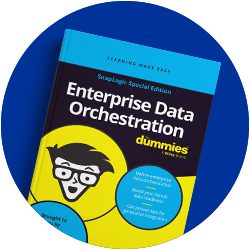Legal Notices
Security
This Acceptable Use Policy (“Policy”) applies to customers’ use of all services offered by SnapLogic, Inc. or its affiliates (“SnapLogic”). Capitalized terms used below but not defined in this policy have the meaning set forth in the Master Subscription Agreement (“MSA”). SnapLogic may change this Policy by posting an updated version of the Policy at www.snaplogic.com and such updates will be effective upon posting.
1. Violations. A customer’s violation of this Policy will be considered a material breach of the MSA and/or other agreement governing the customer’s use of the services.
2. Prohibited Material. Customers may not, and may not allow any third party, including its users, to use services to create, send, upload, display, store, process, or transmit, or permit use of services to create, send, upload, display, store, process, or transmit:
- Material that infringes or misappropriates a third party’s intellectual property or proprietary rights;
- Hate-related material, and/or material advocating discrimination against individuals or groups;
- Material advocating or advancing violent causes, including terrorism or violent extremism;
- Obscene, excessively profane material or otherwise objectionable material;
- Material advocating or advancing criminal hacking, cracking, or phishing;
- Material related to illegal drugs or paraphernalia;
- Malicious material;
- Unlawful software;
- Malicious code, such as viruses, worms, time bombs, Trojan horses, and other harmful or malicious files, scripts, agents, or programs; or
- Material that violates, encourages, or furthers conduct that would violate any applicable laws, including any criminal laws, or any third-party rights, including publicity or privacy rights.
3. Artificial Intelligence. When using SnapLogic’s AI Features, Customer may not and will not allow Authorized Users or any third party to:
3.1 Notice of High Risk Use: AI technology will continue to be used in new and innovative ways. Customer is responsible for determining if its use of these technologies is safe, and for all decisions made, advice given, actions taken, and failures to take action based on its use of the AI Services. These services use machine learning models that generate predictions based on patterns in data. Output generated by a machine learning model is probabilistic, and generative AI may produce inaccurate or inappropriate content. Outputs should be evaluated for accuracy and appropriateness for your use case.
3.2 Disallowed Usage: Customers may not use an AI Feature, nor allow Authorized Users or any third party to use an AI Feature:
- as part of an automated decision-making process with legal or similarly significant effects, unless Customer ensures that the final decision is made by a human being (in which case, Customer must account for other factors beyond the Services’ recommendations in making the final decision);
- as part of an automated decision-making process for payday lending even when the final decision is made by a human being;
- for generating advice that in the ordinary course of business would be provided by a licensed professional (including financial and legal advice); except that Customer may use the Services to support a licensed professional where the Services were not used in the generation of individualized advice;
- for generating or providing individualized medical advice, treatment, or diagnosis to a consumer or end user;
- for explicitly predicting an individual’s protected characteristic, including, but not limited to, racial or ethnic origin, and past, current, or future political opinions, religious or philosophical beliefs, trade union membership, age, gender, sex life, sexual orientation, disability, health status, medical condition, financial status, criminal convictions, or likelihood to engage in criminal acts;
- for submitting images of individuals for the purposes of creating or analyzing biometric identifiers, such as face prints or fingerprints or scans of eyes, hands, or facial geometry;
- for engaging in coordinated inauthentic behavior for the purposes of manipulating public debate;
- for creating or distributing highly deceptive manipulated or synthetic digital media that is fabricated or false but presented as authentic or fact-based, including, but not limited to, deepfakes;
- for engaging in plagiarism or academic dishonesty;
- for any purpose relating to child sexual exploitation or Child Sexual Abuse Material (CSAM);
- for developing, advertising, marketing, distributing, or selling weapons, weapon accessories, or explosives, as enumerated by the United States Munitions List;
- for targeting, generating, or distributing political campaign materials for external public or semi-public audiences;
- for harvesting or collecting information about users of the Services;
- for systematically downloading and storing content, data or outputs from the Services;
- for activity that is or may be: (i) threatening, harassing, degrading, abusive, hateful or intimidating, or otherwise fail to respect the rights and dignity of others; (ii) defamatory, libelous, fraudulent or otherwise tortious or unlawful (including impersonating another person, company, or entity or engaging in misleading or otherwise unethical marketing or advertising practices); or (iii) obscene, indecent, pornographic or otherwise objectionable; or
- attempt to do any of the foregoing or assist anyone in doing any of the foregoing.
- Disclosures. Customers must disclose to end users when they are interacting directly with automated systems, unless there is a human in the loop, and when required by law, provide a means for end users to interact with a human instead of an automated system. Customers agree to provide information about intended uses of the AI Services and compliance with this Policy upon request.


